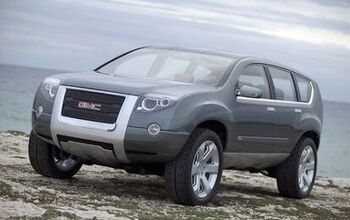General Motors Death Watch 87: Dead Beat
A few days after GM's vice president of vehicle sales, service and marketing assured auto industry analysts that his employer will maintain incentive-free “value pricing," General Motors announced two grand cash back on the 2007 Chevrolet Tahoe, Avalanche and Suburban and the GMC Yukon, Yukon XL and Denali. To be fair, nobody took LaNeve’s price promise seriously. By now, everyone knows GM’s new(ish) SUV’s are a drug on the market, and it ain’t Viagra. There’s only way to move the metal: lower the price. Either that or stop making the damn things.
Last Friday (always Friday), GM CEO Rick Wagoner announced that The General will curtail production of its GMT-900 based SUV’s. Rabid Rick tried to minimize the damage by asserting that GM was going to halt “some overtime” on SUV assembly lines and introduce “other products” into the production mix— as if to say demand for GM’s gas guzzlers was still hot, just not sizzling, and besides, we can make some other stuff instead.
Yeah right. At the end of July, in an industry where a 60-day supply is an acceptable maximum, GM dealers were stuffed to the gills with Tahoes (82 days), Yukons (89 days) and Chevrolet Suburbans (75 days). Although the figures are not far off last year's, these are GM's "new" trucks. August is going to be a bitch.
Meanwhile, Rabid Rick proclaimed that GM's share of the full-size SUV market has “boomed.” According to Wagoner, GM now “owns” 50 to 75 percent of various segments within the SUV genre— which is a bit like saying you’ve scored the best cabins on the Titanic after it hit the iceberg. The executive’s statement was a remarkable piece of spin, but it pales in comparison to GM’s creative accounting. Lest we forget, Rabid Rick ascended to his throne as GM Chief Financial Officer. Here’s a bit of what he’s learned…
Yesterday, The General’s GMAC finance unit signed a three-year, $10b funding facility with a Citigroup subsidiary. Four billion dollars of the money falls into a brand new category for GMAC: “unrated notes”. Unrated notes are papers representing loans that are so far outside traditional credit parameters that the vast majority oif insitutional investors are literally prohibited from buying them.
In other words, GM’s “Zero Percent for Deadbeats” summer blowout left GMAC with billions of dollars of risky loans. No surprise then that GM's finance arm reported that the unrated notes are backed by assets “not typically securitized by GMAC.” OK, here's the "creative" part…
Because the risk is so high, there's a gap between the money GMAC lent its less-than-perfect customers and the amount of money Citigroup paid for the loans. As part of the deal, GM has agreed to cover the shortfall (i.e. securitize the assets). It’s all a bit confusing (by design), but here’s the bottom line: GMAC carries little or no risk for the bad loans. GM buries a “charge” in its sales costs to cover the money paid to GMAC for the dicey loans.
The shell game maintains the illusion of higher average transaction prices, hides huge discounts/rebates and moves vehicles off the lot. Given that GM generates about $28b in North American sales per quarter, $4b in bad debt equals about 15% of sales (assuming 100% financing). Since most of this paper was written in 60 days, as much as 40% of GM's recent sales surge may be directly attributable to bad loans. Put that in your quarterly report and smoke it.
Just like last year’s “Fire Sale for All” program, the “Zero Percent for Deadbeats” program will eventually bite GM in the ass. Can you imagine what these vehicles will be worth when (not if) they’re repossessed? At the risk of sounding, um, deadbeatist, people with sub-basement level credit scores tend to smoke, spill beer, puke, rip up interiors, ding ‘em good and never fix a thing. And speaking of repairs…
In the second financial quarter, GM downgraded its warranty expenses per vehicle to $325 (compared to $523 for the same quarter in ’05). GM’s improving reliability record is admirable, but it doesn’t justify that kind of drop. The revised figure added $433 million (the equivalent of $0.67 a share) to GM’s second quarter “profits.” Clearly, GM is ducking and diving, window dressing its earnings to mask the company’s true performance, or lack thereof.
The truth is things are not going well at RenCen. While GM has finalized its new credit line of $4.5b (on onerous terms), the company still withdrew an additional $2b from its VEBA on July thirty-first to cover health care reimbursement. GM’s continual need to tap into the VEBA account suggests a cash shortage.
Now that the GMAC sale has been postponed until next year, the need for operating funds could well become critical. While the risk of a GM default may not be imminent, a strike at bankrupt auto parts maker Delphi would be the tipping point. In the event of a work stoppage, GM’s credit line would be reduced by a billion dollars.
Industry watchers still say it’ll never happen. Meanwhile, negotiations at Delphi are stalled and the most recent final deadline arrives in two days. If Delphi goes down, GM goes down. If it doesn’t, the company's descent into bankruptcy will merely be postponed.
More by Robert Farago
Latest Car Reviews
Read moreLatest Product Reviews
Read moreRecent Comments
- 28-Cars-Later Let's review Ol' Joe's earlier thoughts on the matterTrump doesn’t get the basics. He thinks his tariffs are being paid by China. Any freshman econ student could tell you that the American people are paying his tariffs.The cashiers at Target see what’s going on – they know more about economics than Trump. #TeamJoe 1:59 PM · Jun 11, 2019I think the cashiers may also know more about managing the presidency too Joe. What is it you do again?
- 28-Cars-Later So the company whose BEVs are without proven lifespan and mired in recalls wants to further cheapen materials and mfg costs of the very same thing they already cannot sell? I don't know if Ford is going to still exist in 2030 (assuming the nation still does of course).
- Fred We want our manufacturing to pay good wages, provide healthcare, not pollute and provide a safe workplace. Many places around the world don't, so we put a tariff on them to force them. That's the way it should be, but I'm afraid this is just a political move by Biden to take away one of Trump's talking points.
- Orange260z Modern Cadillac sedans look and drive great. Yeah, the interior materials aren't quite as good as the competition, but if they undercut them in price it can offset. IMHO, they need to step up in a big way on their warranty, service and customer service. H/K/G shows confidence in the quality of the product by offering long standard B2B warranties and low-cost exclusionary extensions. My Caddy became a money pit after the warranty with only 75K kms; yes, the Germans do that, but they have the established cachet that they get away with it. They need to make sure that their cars still look good after 10 years (i.e. no trim issues, no undercarriage rust issues, etc) - my CTS was all rusty underneath after two years, they told me that was acceptable and not under warranty. Cadillac needs to do more.In Canada, there are few (if any) standalone Cadillac dealerships; they are typically co-located with all the other (remaining) GM brands. However, this doesn't have to be a kiss of death - Lexus successfully built their rep despite co-location, by investing in dedicated Lexus sales areas, sales people, service advisors, technicians, lounge areas with private offices, perks (free coffee/treats, car wash and vacuum with any service, a large complimentary Lexus loaner fleet available for any service visit), etc. By contrast, for Cadillac service I would line up with the 20 other people waiting for one of 5-7 service writers that know nothing about my car because they service 10,000 different GM models, answering a question about maintenance requirements "How am I supposed to know?". During the first 4 years I had access to complimentary Enterprise rental cars as loaners, but I had to spend 20-30 mins going through a car rental process every time. The guy who would do complimentary service washes did so with a big scrub brush he just used to wash a work truck that was covered in mud. They can't sell a premium car with crappy service like that, they have to be better than their competition.If it weren't for these issues I would not have hesitated to buy a new CT5 V-sport (winter DD, want AWD). I bought a G70 instead, we'll see how that goes - but at least I have a long B2B warranty.
- Jalop1991 Are tariffs the right answer? Ask China and Japan. They've imposed lots of protectionist tariffs over the years, but somehow our doing so is horrible or something like that.Let's do the Japanese inspection to the Chinese junk imports, and make the Chinese pay for them.BYD--now available at Walmart and Amazon.

































Comments
Join the conversation
This Chinese market is all fine and good except for a couple of flys in the soup. GMs Chinese operations (as other non-Chinese companies) is only a 50/50 joint venture (in GMs case, with Shanghai aka SAIC, which also has a 50/50 JV with Volkswagen, and bought rights to the Rover designs before Rover imploded, also SAIC owns a portion of "GMDaewoo" and 49% of Ssangyong in South Korea). So, how "dedicated" is SAIC towards the GM JV? They are planning on building cars in COMPETITION with GM and VW for EXPORT soon. The other "catch" is that if GM thinks the 50% owned JV in China is going to carry the rest of their worldwide automotive operations when North American operations is sinking, sinking, sinking - they had better go back to Econ 101. Ain'tgonnahappen dot com. In case everyone's forgotten, the People's Republic of China is a communist state run by a few, and they can change anything on a whim. Like nationalize auto companies, or prevent profits from leaving from JVs, or raise interest rates (they just did that) to slow down the economy. Whatever. The GM guys and the rest of the western JV part-owners had better figure out that they can't simply control everything down at the Mason lodge any more. As in, the tiller isn't in their hands. So, they can join the rest of us, who've never had a tiller in our hands, controlling billions of dollars and millions of lives.
The China market in aggregate is still tiny, and is seeing even higher levels of competition. VW is the established player, and there was a boom in local manufacturing. Add to this FDI in factories (Buick, Toyota - Corolla and Camry are both now built in-country in China), and you come up with... a massive case of oversupply. The Chinese auto market, despite growing dramatically, is still growing slower than production capability - prepare for a winnowing ahead.